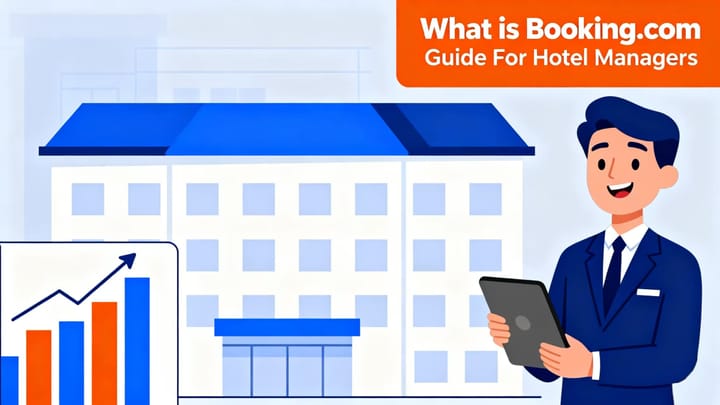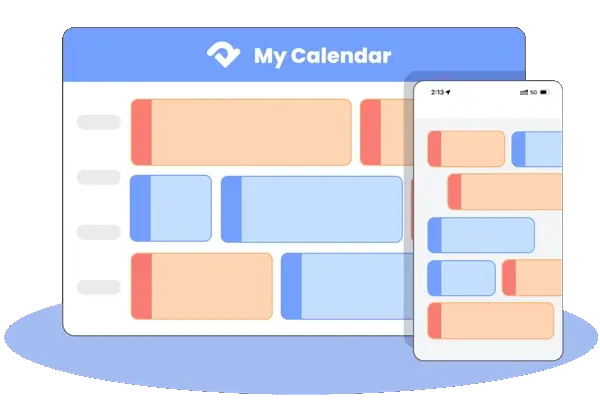Nowadays, online travel agencies (OTAs) play a big part in how guest find and book room. Booking.com is one of the most popular platforms travelers use worldwide. For hotel managers, knowing what Booking.com is and how it works is key to getting more bookings. It helps you get seen and make more reservations, but it also has downsides that need smart handling. This guide explains what Booking.com offers, how it runs, and how hotels can make it work for them.
What Is Booking.com?
Booking.com is a big travel website that helps guest find places to stay. It started in the Netherlands back in 1996 and has grown into one of the world’s largest booking sites. Today, it’s part of the Booking Holdings group. The site lists millions of options – from fancy hotels and small guesthouses to hostels and vacation rentals.
For hotel owners, Booking.com isn’t just a place to list their property. It’s a marketplace where travelers from all over search, compare, and book stays in real time. The site works in many languages and currencies, which helps smaller hotels reach international guests they couldn’t find on their own.
Hotel managers use it for two main things: getting bookings and managing them. Through a special online system, they can update room availability, adjust prices, and handle reservations. That’s why so many hotels rely on it to fill their rooms – it brings in guests while handling the booking work.
How Does Booking.com Work for Hotels?
Getting started on Booking.com means setting up your hotel’s page. You’ll add info like room types, what you offer (WiFi, breakfast, etc.), your rules, and good photos. Once it’s live, travelers worldwide can see your place.
Guests find hotels by searching for a location, dates, and things like price range or star rating. When they book, it’s confirmed right away. You get the booking details through your Booking.com account or a channel manager. Guests might pay you directly when they arrive, or Booking.com might handle the payment – it depends on what you choose.
Here’s how Booking.com makes money: they take a cut (a percentage) from each booking you get through them. How often your hotel shows up in searches depends on things like your prices, guest reviews, and how good your listing looks. That’s why hotels that actively update their info, set fair prices, and get good reviews usually do better than those who just put up a basic page and leave it.
Key Features for Hotels
Booking.com offers tools that help hotels get noticed and turn lookers into bookers:
- Global reach: Access to millions of travelers worldwide, including international tourists who may not find your hotel through local channels.
- User-friendly interface: A search and booking system optimized for both desktop and mobile. This is key because lots of people now book last-minute trips on their mobiles.
- Guest reviews: Real reviews from people who’ve stayed build trust. Higher ratings improve visibility in search results and encourage trust among potential guests.
- Promotional tools: Options like special discounts, last-minute deals, and Genius loyalty program integration help hotels boost occupancy during low-demand periods.
- Extranet management system: A dashboard where managers can update availability, set prices, respond to guest messages, and track performance metrics.
- Language and currency support: Automatic translation and currency conversion help hotels reach guests in diverse markets without added complexity.
Each feature is designed to improve visibility and conversion, but hotels must invest time in optimizing their listings and maintaining strong guest satisfaction.
Costs, Risks, and Trade-Offs
Costs
The biggest cost is the commission: Booking.com takes between 10% and 20% of each booking, with most hotels paying around 15%. That’s higher than some OTAs (like Airbnb, which averages 14%) but lower than niche platforms targeting luxury or boutique hotels.
There are also hidden costs to watch for. If you use “Payments by Booking.com” (their payment processing tool), you’ll pay a small fee (usually 1% to 3%) on each transaction. You might also need to spend time or money updating your listing regularly to stay competitive.
Risks
The biggest risk is relying too much on Booking.com. If most of your bookings come from them, a change in their algorithm (which affects how high your listing ranks) or a commission hike could hurt your business. For example, if Booking.com starts prioritizing hotels with free cancellation over those with stricter policies, your visibility could drop overnight.
Another risk is losing direct bookings. Travelers who find your hotel on Booking.com might never check out your own site – meaning you miss out on that full amount (the commission you’d otherwise keep).
Trade-Offs
The trade-off is clear: you pay a commission, but you get access to a global audience. A small hotel in a rural area, for instance, might struggle to reach international travelers alone – but Booking.com gets your hotel in front of travelers from Europe, Asia, or the U.S. planning trips there.
You also trade some control for convenience. Booking.com handles the marketing and booking process, so you don’t have to spend as much on ads. But you have to play by their rules (like keeping your rates the same across all platforms) to stay a partner.
How Hotels Can Maximize Benefits
To really benefit from Booking.com, hotels need to work smart:
- Optimize listings: High-quality photos, accurate descriptions, and clear policies attract more guests. Highlight unique features of your property to stand out from nearby competitors.
- Leverage reviews: Encourage satisfied guests to leave positive feedback, and respond promptly to negative reviews to show professionalism and care.
- Use promotions wisely: Targeted discounts or Genius loyalty offers can boost bookings during slow periods without permanently lowering rates.
- Manage availability strategically: Keep inventory up-to-date and avoid overbookings by syncing with a channel manager. Offer a mix of room types and flexible cancellation options to appeal to a wider audience.
- Track performance: Regularly review data in the extranet to understand which promotions, pricing strategies, and guest segments drive the best results.
- Balance channels: Keep building your own website and marketing. This helps you save on fees and build stronger guest relationships.
Here’s the thing: Booking.com works best when you treat it as one of your tools—not your only plan. That way, you get the benefits without hurting your long-term profits.
Conclusion
Booking.com is one of the most powerful tools hotel managers have today. It gets your hotel seen worldwide, makes handling bookings easy, and connects you with millions of travelers. But you need to use it wisely to balance the costs and avoid depending on it too much.
For hotel managers, the platform is both a big opportunity and a responsibility. The opportunity? Reaching people all over the globe and filling more rooms. The responsibility? Keeping an eye on commissions, guest reviews, and your own direct booking plans to protect profits and keep control of your brand.
When you understand what Booking.com does and how it works, you can make smarter choices. With the right plan, it becomes a helpful partner that brings in more guests and keeps them happy.

